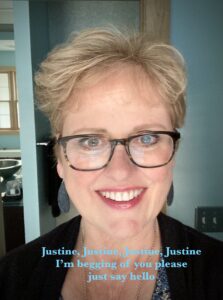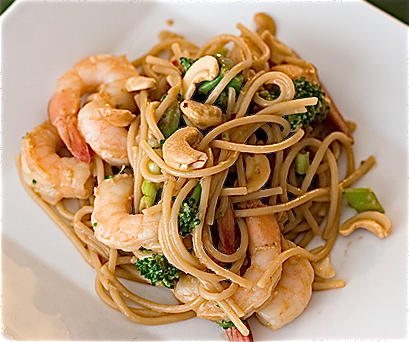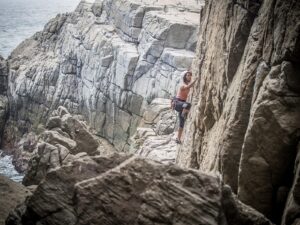“His beauty doth all things excel”
August 26, 2021 | My Jottings
I used to be able to think deeply. I’m having a little trouble with that lately. I don’t know if it’s my aging brain, or if it’s pandemic-related. Maybe it’s both. These days I think of my brain as a water bug, rapidly skating on the surface from place to place, rather than like the mole it used to be, digging deep and slowly exploring tunnels of thought. I take comfort from the fact that I’ve heard this really is a thing, that many people are experiencing this phenomenon. I don’t feel excessively anxious, as I’ve heard some people relate during these days. But I do want my deep thinking ability to come back. I haven’t exactly helped myself, since I pick up my cell phone countless times a day to check the weather (searching for hope that our unending heat and humidity will indeed come to an end), to look at all the curiosities and also photos of those I love on Instagram, to read teeny bits of the news (because I want to be informed but watching the news is no longer an option because who wants to be assaulted in their own home?), to record my water intake on an app I like (because in case you’re new here I donated a kidney last year and hydration is more important than ever for my remaining kidney-gal Verna), to listen to the Pray As You Go app (because it’s truly beautiful and strengthening), and a handful of other helpful inconsequential things.
So I’ve taken very recently to making myself read for longer periods of time. Never in my life did I ever think I’d speak or type those words. Books have been a main source of delight and comfort for me since I learned to read in first grade, at Workman Avenue Elementary School in West Covina, California. Mrs. Jane Webber was my unique first grade teacher and I did okay in spite of the fact that she mildly mocked me for a few things. A six year-old! But in second grade, Mrs. Sarah Lokken read to us out loud for long periods of time every day and I fell in love with Betty MacDonald’s Mrs. Piggle-Wiggle series. I read them to my own children and some of my grands. My love affair with books has continued to this, my 64th year.
Anyway, I have never had a period in my life when I haven’t read deeply and widely, had a pile of books to giddily look forward to, talk about with someone, and savor. I still have piles of books everywhere in my house. I went to the library two days ago and picked up a book I reserved. I have three on my nightstand and can’t ever see that changing. But I will read a short chapter, and then it’s like my brain tells me that’s enough for now. Then I go and get some iced tea, let Mildred out to go potty, answer a few texts, floss my teeth, let Mildred back in, whatever. Then a couple of hours later I might come back to my book, and I am finishing books, but deep reading for hours at a time has not been a part of my life for about a year and a half. It’s almost as if I now have a mild case of ADHD, and I hate it.
I know I need to change my focus. I think if I added up the time I’m spending focusing on things of mild consequence, I would be shattered. Our brains are our precious, prime real estate, and I’ve let squatters move in and given them the best places in mine. My squatters aren’t the kind that dump their garbage and build shanties and use the creek for their toilet. Mine are more respectable squatters, with pretty curtains in the windows and savory smells coming from their kitchens, but they are using my cerebral land nonetheless, and I haven’t taken the matter in hand and given them their eviction notices.
So, as unsubstantial as this might sound, I have two plans for my brain today. I am going to read non-stop for one hour. And I am going to memorize the lyrics to a song I have played on repeat and loved for a long time. These are the lyrics to the song:
The tree of life my soul hath seen,
Laden with fruit, and always green:
The trees of nature fruitless be
Compared with Christ the apple tree.
His beauty doth all things excel:
By faith I know, but ne’er can tell
The glory which I now can see
In Jesus Christ the apple tree.
For happiness I long have sought,
And pleasure dearly I have bought:
I missed of all; but now I see
‘Tis found in Christ the apple tree.
I’m weary with my former toil,
Here I will sit and rest awhile:
Under the shadow I will be
of Jesus Christ the apple tree.
This fruit doth make my soul to thrive,
It keeps my dying faith alive;
Which makes my soul in haste to be
With Jesus Christ the apple tree.
(By Rev. Richard Hutchins)
Oh, how I love this song. And here is what plays in my bedroom at least three times each day, this choir, this version of this beautiful, soul-lifting song:
My book is a decent one, and worth finishing. But this song and these lyrics are the kinds of residents I want to build with on the prime real estate that is my brain and mind. I want stained glass windows, an altar, beauty, rest, nourishment, order, freedom, comfy chairs, piles of books, God’s creation, music, friends, and worship to be ever present there.
I Am
August 17, 2021 | My Jottings
I am the woman at the well, wondering if Jesus really would go out of His way to quench my thirst. I am the man with the son who needs deliverance as I cry, “Lord I believe, help my unbelief!” I am Martha of Bethany, dithering about in my kitchen, blind to the One who is waiting for me in the other room. I am the Pharisee, self-righteous and quick to judge, preferring to obey a set of rules instead of truly following Jesus. I am the thief on the cross, believing that Mercy is hanging right next to me and crying out for Him with all that is in me. I am the one cleansed leper who is finally touched by someone, God Himself, who runs back to say thank you. I am the little boy with some bread and fish, offering my tiny bit to Jesus. I am the lost sheep, wandering and terrified, bleating pitifully until He comes to rescue me. I am the murderer Barabbas, who goes free while Jesus takes his place before the crazed crowd. I am Lazarus, stinking and dead, but not beyond the resurrection power of Jesus Christ. 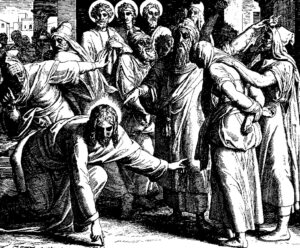 I am Jeremiah, struggling with loneliness and depression, knowing I don’t see the full picture. I am Lydia, and God has opened my heart to the Gospel. I am David, joyful worshiper one day, stealthy and willful sinner the next, who cries out to God in anguish and despair. I am Mary Magdalene, tormented by the enemy, a delivered, devoted follower, and first one to the tomb. I am Peter, puffed up in my certainty, then betraying the One I love in the blink of an eye. I am the hemorrhaging woman reaching for His hem, knowing one particle of His power is so great it will heal me when nothing else can. I am one of the Zebedees, thinking I’m something special, needing to learn humility and how to lay down my life for His purposes. I am Mary of Bethany, yearning for His presence and words, undeterred by any other voice. I am Jonah, going out of my way to avoid God’s will for my life. I am Cleopas, whose heart burns within him when Christ’s words become life. I am Eve, who lets the subtle voice of the enemy raise doubts in her mind about God’s goodness. I am Ananias, pretending to be generous and withholding the truth. I am Jacob, deceitful to my own father. I am Shadrach, knowing there is safety only in God. I am Philip, who wants to say “Come and see,” with every word I speak and write. I am Anna, who only feels at home where God’s presence dwells. I am the centurion who doesn’t feel worthy for Jesus to enter his house, yet knows He can make my children whole. I am Hannah, who has given each of her children to the Lord. I am Thomas, stubborn and needing proof, but quick to call Him my Lord and my God.
I am Jeremiah, struggling with loneliness and depression, knowing I don’t see the full picture. I am Lydia, and God has opened my heart to the Gospel. I am David, joyful worshiper one day, stealthy and willful sinner the next, who cries out to God in anguish and despair. I am Mary Magdalene, tormented by the enemy, a delivered, devoted follower, and first one to the tomb. I am Peter, puffed up in my certainty, then betraying the One I love in the blink of an eye. I am the hemorrhaging woman reaching for His hem, knowing one particle of His power is so great it will heal me when nothing else can. I am one of the Zebedees, thinking I’m something special, needing to learn humility and how to lay down my life for His purposes. I am Mary of Bethany, yearning for His presence and words, undeterred by any other voice. I am Jonah, going out of my way to avoid God’s will for my life. I am Cleopas, whose heart burns within him when Christ’s words become life. I am Eve, who lets the subtle voice of the enemy raise doubts in her mind about God’s goodness. I am Ananias, pretending to be generous and withholding the truth. I am Jacob, deceitful to my own father. I am Shadrach, knowing there is safety only in God. I am Philip, who wants to say “Come and see,” with every word I speak and write. I am Anna, who only feels at home where God’s presence dwells. I am the centurion who doesn’t feel worthy for Jesus to enter his house, yet knows He can make my children whole. I am Hannah, who has given each of her children to the Lord. I am Thomas, stubborn and needing proof, but quick to call Him my Lord and my God.
And… I am His,
Wednesday’s Word — Edition 149
August 11, 2021 | My Jottings
Take, Lord, and receive all my liberty, my memory, my understanding, my entire will – all that I have and call my own.
You have given it all to me. To you, Lord, I return it.
Everything is yours; do with it what you will.
Give me only your love and your grace.
That is enough for me.
~~~~St. Ignatius of Loyola
* * * * * * *
Some Old Gal Prattle
August 9, 2021 | My Jottings
A couple of weekends ago we had one day that gave us a break from the heat and humidity, so Lloyd and I decided to take an early morning bike ride. We usually ride on the Lakewalk near Lake Superior, sometimes going ten miles if our butts don’t complain. Lloyd now has men’s padded cycling shorts and says they really help. The thought of adding padding of any kind to my clothing makes me laugh, so I haven’t gone that route yet.
We rode up and away from the Lake for the first time, all the way to Forest Hill Cemetery where Michael is buried and where my body will someday be laid to rest next to his. Most of the way is uphill, some of it eye-bulgingly steep, which would have made it impossible without our RadCity Ebikes. Even at full power, there were a few hills where I had my bike in first gear, full throttle, and still had to peddle with all my might to get up the grade. (Cue the Wizard of Oz song when Miss Gulch is furiously peddling.) But we made it. And then we rode around in the cemetery, under the shady trees that overhang the quiet lanes. We stopped to water the flower basket at Michael’s grave, and I took this picture.
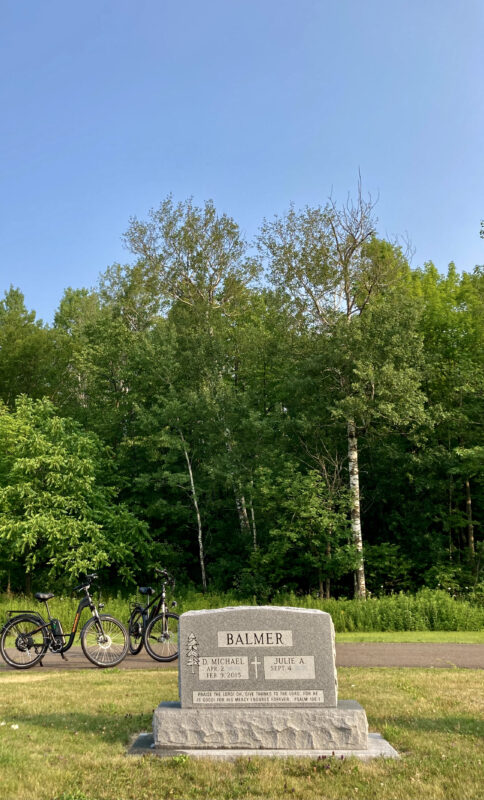 Six years ago I could never have envisioned for my life all the things that have taken place since Michael died. Sometimes it still surprises me that I’ve been remarried for almost two years, that I actually own and ride an electric bike, that I donated a kidney named Justine to a stranger in Madison, Wisconsin, that I still floss my teeth twice a day, and that I joined the Senior Citizen Traveling Circus and began training to be a trapeze artist. Who would have thought? No one, especially me. (Or that my sense of humor has taken a twisted turn, in case you hadn’t figured that out.)
Six years ago I could never have envisioned for my life all the things that have taken place since Michael died. Sometimes it still surprises me that I’ve been remarried for almost two years, that I actually own and ride an electric bike, that I donated a kidney named Justine to a stranger in Madison, Wisconsin, that I still floss my teeth twice a day, and that I joined the Senior Citizen Traveling Circus and began training to be a trapeze artist. Who would have thought? No one, especially me. (Or that my sense of humor has taken a twisted turn, in case you hadn’t figured that out.)
Anyway, I have had a few medical mysteries that have needed solving in the past couple of years, and even Mayo Clinic didn’t seem able to help. (It’s no fun to know people who go on and on about their symptoms, but here I am, getting ready to do just that.) I have had an alarmingly elevated CRP (C-Reactive Protein) level for a few years now. Normal is 1–4, mine has gone from 1.4 to 7 to 7.4 to 11 to 11.7 to 13. It’s an inflammation marker and if you look up the numbers mine say I’m in danger of an imminent event. I feel at all times like I’ve got this low-grade burn going on in every cell of my body, yet I am always chilled.
Then several weeks ago I started to feel awful. I had a headache 24 hours a day, was gasping for air when just walking from my bedroom to the kitchen, and felt like I was constantly moving in slow motion or underwater, with no energy reserves. I’ve always been someone who had plenty of energy, from the time I woke in the morning until I went to bed at night. I’ve never needed naps, rarely felt fatigued, and I began staying quiet and not talking much in an effort to conserve energy. It was disconcerting because I could feel how wrong something was deep inside.
So I decided to have all my medical records transferred to an internist, and I had my first appointment with her recently. I’ve been told that internists solve medical mysteries and I thought, “Sign me up with her.” My blood tests came back all haywire, with pink colored red blood cells instead of red ones, distorted and misshapen blood cells, high sed rates, and more. I’ve always had good test results and am one of the few old people who takes no medications because my health has always been good. My doctor had more tests run when she saw all the weirdness, and called me to tell me my iron was so severely low and I needed to have an endoscopy and colonoscopy as soon as possible to check for internal bleeding.
Oh, then came the delightful low-fiber diet and fun 24-hour prep for having tubes fed through your body. Thankfully, the gastroenterologist found no bleeding, no tumors or polyps, and said I’d be contacted after the tissue biopsies came back. I guess they check for every little thing, including celiac disease.
Well, I learned what the problem is — a significant H.pylori infection in my stomach. Over half the planet’s population has H.pylori, but apparently it takes hold in some people and causes all kinds of trouble, including iron-deficiency anemia and elevated CRP levels. Aha. So this brew of replicating, acid-eating, gut-damaging bacteria could be the reason for all my trouble. They are hard to eradicate, however, so two antibiotics and an acid inhibitor must be taken three times a day, for two weeks. And the nurse said, “Be sure to eat yogurt — you don’t want a yeast infection!” No. I did not want that on top of weirdly shaped, red blood cells that aren’t red and don’t carry any iron and make me feel sick and gasping and 87 years old.
I got to the end of my round of big gun antibiotics, and even though I took probiotics three times a day, ate yogurt and drank kefir, I got a systemic yeast infection. Such a very pleasant experience. Next were more pills to counteract that, and thankfully I’m finally feeling better.
I won’t know for a few weeks if the H.pylori are gone, if my CRP goes down, whether or not my iron rebounds and my red blood cells begin to look like they should, but today, I don’t have a headache. I still get out of breath more than I used to, but I can now walk from one end of the house to the other without needing an oxygen tank. So, I have much to be thankful for. I had a lot to be thankful for even when my stomach was an evil cauldron of bacteria, but I’m cautiously optimistic today.
Today I have a pot of soup simmering on the stove, and tomorrow I will take some to a dear friend who has had a challenging diagnosis. I love her and know I can’t do much, but I can take her a meal.
I just finished a unique book you might like called The Story of Edgar Sawtelle and am now back into Kathleen Norris’s The Cloister Walk. The former makes me want to own seven large, well-trained dogs, the latter makes me want to drive to an abbey in North Dakota and spend a week with the monks there, praying the liturgy.
What book are you reading right now?
One Year Kidney-versary
August 5, 2021 | My Jottings
Good morning friends. Are you all staying cool wherever you are? We almost aren’t here, in the Air-Conditioned City of the North. In Northeastern Minnesota. The state known for bitter cold, for snow on the ground over half the year. For no one needing air conditioning because we are so far north, so close to the cold shores of cold Lake Superior. But times they are a-changin’, as one Northern Minnesotan famously wrote, and we have had sweltering, humid, smoky air for weeks and weeks now. I live a block away from Lake Superior and can’t see that exquisite sapphire blue because of the smoke in the air. I can’t imagine how it must be for those close to the fires that burn out west. I am one of the ones blessed with central air conditioning and it has been running around the clock for so long.
Today is my one year anniversary of donating my left kidney Justine. Last August 5th I went under the knife in a freezing operating room at the Mayo Clinic in Rochester, Minnesota, and a transplant surgeon opened up my belly, reached into the parenchymal depths all the way to my back, peeled away my adrenal gland and removed my healthy kidney and corresponding ureter (and some kidney fat is always taken as well, who knew?), put it on ice and handed it to a courier, who rushed it in a red cooler to the Minneapolis airport. It was flown to Madison, Wisconsin where another surgical transplant team was gowned, masked, gloved up and waiting, along with Justine’s recipient.
I have always hoped to hear something from the person who now has my kidney. The one that the Lord knit with His own hands while He was forming me in my mother’s womb in early 1957 in Covina, California. My son-in-law Chris, who needed a new kidney desperately but who is a different blood type so couldn’t receive mine, received a wonderful note from his donor months ago. I donated as part of Mayo Clinic’s Paired Donation Program, which allows people who want to help a loved one but aren’t a match, to give to someone else, while another donor gives to their loved one. Sometimes donation chains can involve up to two dozen people — can you imagine organizing the details and the operating rooms and flights for that kind of a situation?
Our situation involved only four people. On the morning of August 5th, I donated my kidney in Rochester, and at the same time Chris’s donor, a 27 year-old Good Samaritan donor named Blaine who listened to a podcast about kidney donation at work, signed up online with The National Kidney Registry, and generously decided to give a vital organ to a stranger, was undergoing his donation surgery in Denver. Blaine is from Amarillo, Texas, but had his surgery in Colorado.
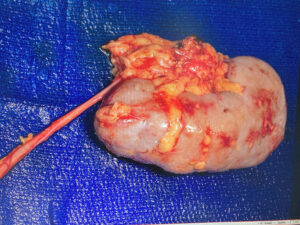 Once Blaine’s kidney, a perfect match for my son-in-law, was on ice and put on a plane from Colorado to Minnesota, they began to get Chris ready. Once my kidney was on its way to Madison, my recipient was also being prepared. All four of us, so closely tied, yet two completely unknown to the others. It’s such a miracle to me still.
Once Blaine’s kidney, a perfect match for my son-in-law, was on ice and put on a plane from Colorado to Minnesota, they began to get Chris ready. Once my kidney was on its way to Madison, my recipient was also being prepared. All four of us, so closely tied, yet two completely unknown to the others. It’s such a miracle to me still.
All I was told about Justine was that her person had done well during the transplant, and his/her kidney function was excellent. Is that amazing, or what? A fist-sized piece of tissue from my then-62 year old body was placed into the lower front abdomen/hip area of a very sick person in Wisconsin who had waited Lord knows how long for hope, and within a day, his/her blood pressure was normalized, the toxins that had built up were finally being flushed out of their exhausted body, new red blood cells were being made, and things put to right. How did you do that, God? Because I know it’s science, but I also know no scientist could make a kidney, and make it do all the precise and powerful things it does. That piece of flesh above might look gross to some, but I see God’s fingerprints all over it, and I am in awe.
Chris’s new kidney from Blaine in Amarillo did the same for him. He named his Magnus, and there was a lot of cleaning up to do since Chris had been in severe kidney failure for a long time. Magnus really rolled up his renal sleeves and took over.
I had hoped by now to hear from Justine’s new owner, but I haven’t. It’s possible I never will, and I accept that. I have never expected fanfare or even a thank you, but my intensely curious nature would be so happy to know a few details. Is Justine’s new owner old? Younger? Man, woman, black, white, brown, married, single? Children or grandchildren? Church organist, former drug user, gardener, sailor, news anchor, knitter, sitter. Anything? My friend Vicki faithfully prays that Justine’s person will send me a card, and I prayed that very thing this morning. Unless you’ve gone through this, it’s hard to explain, even though I’ve just spent a thousand words trying to do just that.
The other evening Lloyd and I were working on a puzzle, a circular 1000-piece puzzle of planet earth from space that is making me cross-eyed and is one of the hardest ones we’ve ever done. As I took a break and glanced out the window in the dusk, I saw a rabbit digging. We watched her dig her nest for a full thirty minutes, going horizontally underground past her neck, but doing so in a manner that left the grass above her undisturbed. She acted like she knew what she was doing.
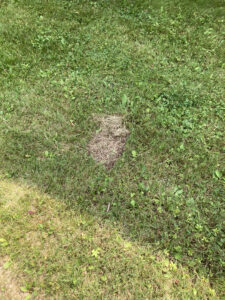 Her mate stood off in the distance watching, and when he approached to give a paw, she chased him off. She rested for about ten minutes, then began to vigorously pull dry grass (of which there is no lack, due to the aforementioned heat and lack of rain) out of the ground with her mouth, until she looked like she had a thick straw mustache sticking out on either side of her face. She hopped over to carefully fill the nest with these piles of grass, then plucked again, filled the nest again, and so on.
Her mate stood off in the distance watching, and when he approached to give a paw, she chased him off. She rested for about ten minutes, then began to vigorously pull dry grass (of which there is no lack, due to the aforementioned heat and lack of rain) out of the ground with her mouth, until she looked like she had a thick straw mustache sticking out on either side of her face. She hopped over to carefully fill the nest with these piles of grass, then plucked again, filled the nest again, and so on.
Then Mama arranged some dead grass over the hole, and this is what it looks like. I went out the next day and could see at one end of this patch that it’s deeper and goes underground. I haven’t checked to see if she has given birth yet. She will come and nurse at night, then leave the nest relatively unvisited during the day.
It made me wonder how many rabbit’s nests I’ve seen before and never realized it, because it truly just looks like a patch of dry grass.
These photos aren’t the greatest and this next one was taken through a window screen, but if you look closely you can see the process. She’s there digging, and hasn’t gotten to the part where she gets down underground yet.
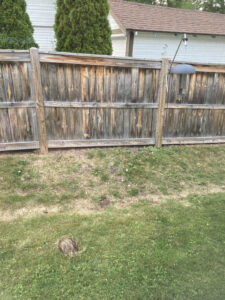 I saw Mama sitting on top of the nest the night before last, and after a couple of minutes she hopped over closer to the fence that divides my narrow back yard from the neighbor’s garage, and began grooming herself and gathering fur from her chest. She most certainly added this to the piles of grass so the bunnies will stay warm and covered.
I saw Mama sitting on top of the nest the night before last, and after a couple of minutes she hopped over closer to the fence that divides my narrow back yard from the neighbor’s garage, and began grooming herself and gathering fur from her chest. She most certainly added this to the piles of grass so the bunnies will stay warm and covered.
We are fairly overrun with rabbits in our town and I realize they’re considered pests, as are squirrels and chipmunks and marauding black bears, but I love seeing creatures do what they were created to do. It seems like it’s hard to find human creatures doing what they’re supposed to do sometimes. Some of us have our purposes confused and think our main jobs are to vehemently disagree online with others, foster unrest and division, and forget what it might be like to walk in someone else’s shoes.
So I turn to the stars and planets when I can see them, to ponder the bigness of God. And I study a mother rabbit expertly preparing for her litter, so I can remember that He is able to show anyone how to live. I see the goldfinches at our feeder and this reminds me that it’s worthwhile, healing and encouraging to contemplate how much He loves beauty and variety.
Last night I spent some frivolous time working on a song pertaining to my kidney in Madison. (By the way, my remaining right kidney is named Verna, and a recent blood and urine workup revealed that she is finally taking up the slack after the shock of losing her partner. My kidney function numbers have increased and most likely Verna has stopped pouting and is actually growing physically larger to make up for Justine’s disappearance, something the nephrologists call hypertrophic compensation.)
This song about my donated kidney Justine is called Justine. I realize I’m slaying you with my originality and creativity. It’s set to the same tune as Jolene by Dolly Parton.
Justine, Justine, Justine, Justine
I’m telling you I just don’t understand
Justine, Justine, Justine, Justine
To have no news is not what I had planned
Your ureter was so pristine
The toxins flushed like a machine
All the water that I drank had kept you clean
You passed the tests, you made the grade
For months so many prayed and prayed
And they cut you right out of me Justine
It took a while for me to heal
My GFR tells me it’s real
And I thought that I would hear by now Justine
I wonder who you’re helping now
Do they just say “hurray!” and “wow!”
And I hope I still might learn someday Justine
Justine, Justine, Justine, Justine
I’m begging of you please just say hello
Justine, Justine, Justine, Justine
Have them reach out before it’s time to go
There are a few more verses to Dolly’s Jolene, so I really think the song about my kidney Justine should have some additional verses too. Anyone volunteering? 🙂
I hope your kidneys are functioning well, and if they are, I hope you’ll consider donating. You really could save someone’s life!
Did you know you don’t have to pay for anything if you donate an organ? Meals, travel, lodging, can all be covered. Did you know that you would never be chosen as a donor unless the testing revealed you could live healthily without a kidney? They go to great lengths to make sure the donation is right for the donor as well as for the recipient. Click here to see if you could be a donor.
I also hope you’re staying cool wherever you are, taking time to watch the wildlife nearby. If you need something miraculous to watch, try seeing what kind of breathtaking magic God has put in the brain of the plain, tiny Japanese puffer fish.
This video never fails to thrill me, and I’d be willing to bet there are a few of us who could use the right kind of thrill these days. Click here and prepare to marvel.
Must Haves
July 8, 2021 | My Jottings
My daughters’ voices
A smooth writing pen
Something good to read
SmartWool socks
A long talk with a friend
Birkenstocks
Eye drops by the bed
Uplifting music in the background
A long warm cardigan
Mentos gum
Stök cold brew coffee
Lavender essential oil and wool dryer balls
My gratitude journal
Water in my Yeti cup all day long
Acorn slippers
LOC in a hot bath
Time alone
Nest-flix each morning
Cool, dry air
Frazier fir foaming soap
Community Bible Study
Honey in my tea
Birdsong
God’s peace
A to-do list
White vinegar in the washer rinse cycle
Tiny lamp light
Nature shows
Reconciling to the penny
Cardinals outside my window
Plackers floss picks twice a day
Romaine and blue cheese
Early to bed
Windchimes
Trees
The hope of heaven
* * * * * * *
What are some of your must-haves?
Thai Shrimp and Noodles
July 1, 2021 | My Jottings
From the archives… but I think you should try this recipe so I’m posting it again.
I’ve made Thai Shrimp and Noodles for years, but it has been a long time since I fixed it. I like shrimp, but don’t eat very much of it, since it’s a bottom feeder and all. So once or twice or thrice a year, I might make something with shrimp. I can’t remember where I got this recipe or I would give proper credit. I’ve tweaked it for our family’s taste and thought I’d share it with you. We had it last night and there were some “mmm-mmm good!” comments.
Thai Shrimp and Noodles
16 ounces broken spaghetti noodles
1 pound broccoli flowerets (about 4 cups)
1 pound fresh or frozen shrimp
2/3 cup creamy peanut butter
2/3 cup soy sauce
8 tablespoons seasoned rice vinegar
4 tablespoons sesame oil
1 dash Tabasco or 1 teaspoon crushed chili peppers
2 tablespoons grated ginger root (I like to use the kind that comes in little jars)
4 cloves garlic, minced
8 green onions, chopped (white and green parts)
1/2 cup chopped, raw cashews
In a very large pot, bring a large amount of water to boiling. Add pasta; cook four minutes. Add broccoli; cook two minutes. Add shrimp; cook 2-3 minutes.
Meanwhile, in a bowl, combine peanut butter and soy sauce. Stir in vinegar, sesame oil, chili peppers or Tabasco, ginger root and garlic. I like to whisk this all together to mix the peanut butter in with everything well.
Drain spaghetti mixture and return to the pan. Add the peanut butter mixture, green onions and nuts. Toss gently to coat. Serve in warmed pasta bowl. Makes 6 generous servings.
* * * * * * *
What’s for dinner tonight at your house?
The Kindest Kelly
June 27, 2021 | My Jottings
From the archives…
Her name tag said Kelly. She was a ticket agent in a smart navy blue uniform with green trim, behind the Eastern Airlines counter in the Atlanta airport. It was 1979 and I was 22 years old, a heartbroken and exhausted young mother with two tiny daughters in tow, eleven pieces of luggage to keep track of, and a bleak-looking future before me.
When my then-husband Glenn decided to rather suddenly end our marriage in Germany so he could be with another woman (who also needed to end her marriage), I just had to get home to Southern California. The Air Force required meetings and copious amounts of documentation to warrant their issuing airline tickets earlier than the planned three years we were all to be stationed in Germany. By the time a few weeks had passed and the Base Commander gave the go-ahead, I was anxious to depart and to return someplace where we were wanted. I’m not sure my mother wanted us to move lock, stock and barrel into her quiet West Covina home for six months and nearly turn it upside down with sorrow and baby and toddler paraphernalia, but she was gracious to welcome us and let us stay for a time, so I could find a job and get on my emotional feet.
The Air Force travel agent (if there is such an animal) issued our tickets, and the itinerary was mind-boggling.
Our first flight was from Frankfurt to McGuire AFB in New Jersey, a long flight filled to the brim with military personnel and their families. I’d been issued two tickets, so two year-old Sharon and I had seats, and eight month-old Carolyn was on my lap for the entire eight and a half hours. Thank God she was a nursing babe.
We were not allowed to deplane in New Jersey, and the big jet then took us to Charleston AFB in South Carolina in about an hour and a half. Here our military transport ended and we had to find a way to get to the civilian airport in Charleston, with all our possessions. We had two bags for each of us (because we had to bring everything we owned, aside from furniture, which would be shipped across the Atlantic in six weeks), a diaper bag, my purse, a folded high chair, an infant car seat, and I can’t remember what else — I just know there were eleven pieces. I will never forget that. Can you imagine trying to travel with eleven pieces of baggage today? Impossible, and not even allowed.
As I stood on the sidewalk at Charleston AFB with Carolyn on my hip and Sharon holding my hand, surrounded by our bags, a man approached me and asked if I needed to get to the civilian airport. He was driving a bus there and kindly loaded everything up and we were on our way. Once we reached the smallish airport in Charleston I knew we’d have a layover but I must have put it out of my mind since the first time I’d seen the tickets days before. The girls and I settled in to a row of connected airport chairs and my eyes probably bugged out of their dark shadowed sockets when I looked up at the screen and saw that our layover was nearly six hours.
Yes.
No place to go, no cribs for sleeping little girls, no real restaurant to speak of. And of course no cell phones in 1979.
I did my best, cheerfully reading to the girls, making a big deal out of snacks and water, taking frequent potty breaks and changing diapers, helping Sharon curl up in a chair to rest, and leaning back in mine so Carolyn could doze on my shoulder. My sweet little daughters were so good. They were tired, but were cooperative and easy to console. It makes me tear up just to think about it now.
When we finally boarded our next plane we were headed, not for Los Angeles which was my neck of the woods, but for Atlanta, because that’s the way the Air Force travel agent planned it for us.
Because everyone knows the best route for a single woman with two little children and a bunch of baggage is Frankfurt–>New Jersey–>Charleston AFB–>Charleston civilian airport–>Atlanta, Georgia–>Los Angeles, California.
This flight was about an hour, I think. We waited six hours to fly one hour. In Atlanta we now had a four hour layover. And I remember thinking we had landed in the biggest airport in the world. The concourses seemed endless and the crowds were thick. Our ticket changed to Eastern Airlines (now defunct) and we got in a long line to check in and get our boarding passes. Again, this was before the days of online or kiosk check-ins.
By the time we neared our turn at the ticket counter, Sharon, Carolyn and I had been traveling for over nineteen hours. Sharon was almost sleeping on her two year old feet as she shuffled along beside me, holding my hand. Carolyn was fitfully sleeping on my shoulder as I held her and my purse and the diaper bag, and who knows what else. When the attractive blond woman named Kelly called me forward and took my ticket, she must have seen the exhaustion in my face, and assessed my situation quickly. “How are you this evening, Julie?” This was going to be the red-eye flight from Atlanta to LAX, but until Kelly had greeted me I’d lost all sense of time. The compassion in her eyes and concern etched on her face was too much for me. I started to cry, and I told her right then and there that my husband had decided to take up with someone else and had sent us home from Europe. Kelly deliberately put down the paperwork, stilled her hands and looked straight into my eyes and said with quiet fierceness, “How. Dare. He.” I can’t even convey how much her words meant to me. She was outraged on my behalf and for my little girls, and what happened next I will never forget.
Kelly quietly issued me FIVE seats on the flight from Atlanta to Los Angeles, all across the center of an L-1011. And I didn’t have to pay anything extra. I’d never been on such a big plane. Here’s an old picture so you can see the five seats at the center of the L-1011. 
Then she closed her side of the counter and let the other agents continue issuing boarding passes, and she led me and the girls to a comfortable bed in a private employees’ lounge, where she brought us blankets and pillows and encouraged us to get some sleep. Kelly assured me she would come get us in time to board the plane. So we slept in this blessed, quiet place for over three hours, and I thanked God for Kelly.
When Kelly came to wake us in time to board, she escorted us onto the plane before anyone else, like we were some kind of VIPs. Even the First Class flyers were still waiting to board. She gave us more blankets and pillows and I was able to sit in the middle of the five seats, and Sharon and Carolyn each had a bed made of two seats on either side of me. They both slept almost immediately.
As Kelly was about to go back to her job behind the Eastern Airlines ticket counter, she bent over toward me and wished me well on this flight and in my life. I couldn’t thank her enough.
I have told the story of my encounter with Kelly many times. Several people have speculated that she might have been an angel because of the ways she ministered to us, citing Hebrews 13:2, which says,
“Forget not to show love unto strangers: for thereby some have entertained angels unawares.”
I’m pretty sure Kelly wasn’t showing such love and kindness to me because she thought I was an angel. I wasn’t. And am not one still. But even though I wasn’t the one showing such love and care to her, I never completely discounted the fact that Kelly could have been divinely dispatched to come to my aid on that grueling trip. A ministering angel, perhaps. Or perhaps she was just a really wonderful woman who used the authority she had to soften my way.
Forty-one years have passed, and I have prayed that God would bless Kelly for the way she took care of Sharon, Carolyn and me. If Kelly is still alive, she’s probably in her early seventies by now. I hope someone is making sure she sleeps well and is gently covered at night. I hope there have been friends who’ve come along side her and expressed their outrage at any injustices Kelly has had to endure. And I pray that all the things she did for me during that short time, giving me five seats on the plane instead of two, finding a quiet place of rest for us, going out of her way to help and comfort us during such a terrible time, are multiplied back to her a thousand times.
I’ve known a handful of Kellys in my life, but the Kelly who worked for Eastern Airlines in Atlanta, Georgia was the kindest Kelly I’ve ever met.
O time, whither dost thou fly?
June 19, 2021 | My Jottings
A few days ago two of my granddaughters came to spend the night with me. Lovely Louisa is eight and is Sharon and Chris’s youngest. Marvelous Miriam is six and is Carolyn and Jeremy’s next-to-the-youngest. I use those adjectives intentionally — Louisa is lovely, but she is also a child who loves. She has a big, unselfish heart for such a young child. And Miriam is a marvel — a beautiful work of God who blesses our family and makes us marvel at Him and the way He creates children and actually gives them to us.
We did all the things we normally do when my grands visit — we had scrambled eggs for breakfast (“Grandma, please make sure the eggs aren’t slimy!” requested Miri), watched a couple of cartoons on television, played games, read books, took a bubble bath, braided newly washed hair, and played outside. And I was the official Counter of the Cartwheels and the Timer of the Headstands.
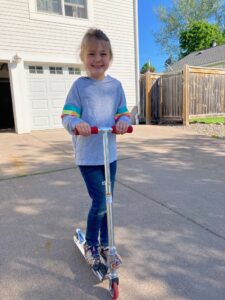 This is Miriam, with a smile that lights up the whole world, a voice that sounds like the morning song of a bird, and a heart of love and cheer that touches everyone who knows her. She chose the red scooter from Grandma’s scooter stash, and went up and down the sidewalk on my street while I sat on the driveway in a camp chair and told her how great she was doing each time she whizzed by.
This is Miriam, with a smile that lights up the whole world, a voice that sounds like the morning song of a bird, and a heart of love and cheer that touches everyone who knows her. She chose the red scooter from Grandma’s scooter stash, and went up and down the sidewalk on my street while I sat on the driveway in a camp chair and told her how great she was doing each time she whizzed by.
Miriam just finished Kindergarten, a lot at home and some at school. She makes friends easily and shows her love to others in a way I so admire and delight in.
The resemblance between Miriam and her paternal grandma Diane is uncanny. When I look at Miri I see Diane, and then feel all the more love for her because that grandma is one of the greatest treasures in my life.
Louisa just finished third grade and looks so much like her mama. She is very attuned to the feelings of others and has a heart to comfort and serve. She is kindhearted, has a wonderful sense of humor and goofiness, and is so easy to be around. Her very presence is a gift. I’m the only living grandparent for Louisa and her siblings, and I want to be around a few more years to give them a good memory or two.
Louisa has a new pair of roller blades, and I recently took her to the cemetery where she practiced (with knee and wrist pads) staying upright and I sat in the shade with my summer Bible study lesson Jesus in Me by Anne Graham Lotz. We stopped at McDonald’s to pick up a lunch for her, and while she ate her chicken nuggets she sat on a rug and read a book in the sun.
When Louisa had enough rollerblading she sat on my lap and we laughed together about a few things. She had a lot of energy to expend, so I gave her some running instructions without pointing, so she would find things on her own: “Run to the headstone that is white and very tall, then go touch the place where a flag with the color red stands, then run to the twin trees, and back to me.” She did it.
“Now run to the black bench with a lantern near it, then to the grave with yellow flowers, then touch the green basket, and find the headstone with the name ‘Bolf’ on it, then back to me.”
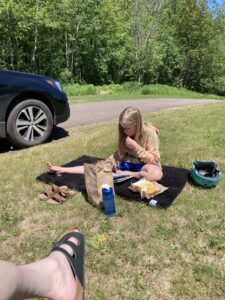 She completed that. When she grew restless with my quiet studying we drove through the lanes of the cemetery and rolled to a stop when we came to the resident geese with their new babies. There’s one group I call The Ladies, and Louisa likes when I lower my window and call to them, “Hey Ladies!” and they all come waddling over to my side of the car, looking crazily sideways with their blue eyes, hoping I’ll toss them a crust of bread.
She completed that. When she grew restless with my quiet studying we drove through the lanes of the cemetery and rolled to a stop when we came to the resident geese with their new babies. There’s one group I call The Ladies, and Louisa likes when I lower my window and call to them, “Hey Ladies!” and they all come waddling over to my side of the car, looking crazily sideways with their blue eyes, hoping I’ll toss them a crust of bread.
When you get to be my age (63), your thoughts begin to change. I think about when Louisa was a baby, how she came to spend time with Grandpa Michael and me on Fridays. She was just newly walking. She wanted me to pull the lever on a toy that played “Old McDonald” and played animal sounds over and over again. When “Old McDonald” would play she would wag her head back and forth vigorously like Ray Charles used to do when playing his piano, and I still have that video and watch it. Why does it bring tears? Why does the passage of time seem so painful to me now? A quote by C.S. Lewis sheds light on this:
“For we are so little reconciled to time that we are even astonished at it. ‘How he’s grown!’ we exclaim, ‘How time flies!’ as though the universal form of our experience were again and again a novelty. It is as strange as if a fish were repeatedly surprised at the very wetness of water. And that would be strange indeed: unless of course the fish were destined to become, one day, a land animal.”
I think that is it on the button — I am so little reconciled to time I am astonished at it. Lewis posits that we chafe at time because we are eternal beings who live temporarily within the constraints of time. I believe that with all my heart.
I don’t want Miriam to grow up and change, even though I know it is God’s will and He is growing her every moment. I don’t want Louisa to become a teenager, then a grown woman, even though I know that is part of God’s plan and He can be trusted. I want their lives to be suspended in time, I want them to stay eight and six for a millennium or two. I want Louisa’s blue eyes to stay huge and full of wonder, her teeth to stay slightly crooked and her smile to be that gummy breathtaking masterpiece it is right now. I don’t want Miriam’s voice to deepen and stop sounding like a robin outside my window in the morning. I want her to stay as she is, loving children’s cooking videos, adoring her daddy, welcoming everyone as a new friend. I don’t want that smile you see in the photo above to change to something dimmer, less eye-crinkling. Why, oh, why, is the passage of time so achingly, astonishingly painful and beautiful?
I don’t want the day to come when they won’t want to spend the night at Grandma’s anymore, where they have to shower themselves, where they won’t sit in front of me in warm jammies and wet hair, waiting for me to French braid their hair. I don’t want to see the day when they have cell phones and don’t answer my texts. I loathe the thought of the day (for it has already happened with some older grands) when they’ll say “Meh,” when asked if they’d like to come spend the night. I don’t want other children to hurt them, gossip about them, lie about them, ignore them. I don’t want them in environments where Jesus and His love will become faint and the lure of friends and the world will beckon loudly and stridently. I don’t want the world to teach them to disrespect themselves and to go looking for treasure in moldy crates of pyrite and colored glass. I want so much for them. I would give my life for them in one second without a hesitating thought.
So I do what I’m supposed to do, even though when I drop them off at their homes I sob almost uncontrollably as I pull out of their alleys. I pray for them. I plead with Jesus for them. I write their names repeatedly in my prayer journal and ask for impossible things for them. I can do that, because God’s love and power are limitless and His faithfulness reaches to the heavens…. which we now know, thanks in part to Hubble, are billions and trillions of miles deep and wide and high. I ask God to make Himself known to them now and for their whole lives. I ask for godly friends, protection, confidence, humility, industry, mercy, joy, self-control, wisdom, love, adventure, prayer, wholeness, wonder, and more. I never stop asking. Pages and pages and pages and pages…. I ask. I write their names and weep because they are my flesh and blood and I love them more than I have words to tell or ways to show. I bring them to the feet of Jesus and say, “Oh Lord, here are my treasures. Please.”
I don’t do this just with Louisa and Miriam of course. I do this with my three grown daughters. My two sons-in-love. All my grandchildren. I do pray regularly for other people, especially friends. Most likely if you are reading this I have prayed for you.
But these exquisite children make me ask, no, almost wail, “O time, whither dost thou fly? Why dost thou torment me so?”
And then I breathe deeply in and out, and reach for the seventh Kleenex, and I say, “Lord Jesus, thank you for Miriam and Louisa. Thank you! May your will be done. They belong to you, really. Help us trust you Lord. Amen.”
